Posted by
Chelsea – July 29th, 2007
 After expressing my favorable view of the Harry Potter novels recently on my blog I was asked by one reader why my view on the subject is so “contradictory to others who are so Catholic and so pro-life.” She specifically pointed out the view of Pope Benedict who, while still Cardinal Joseph Ratzinger, wrote a letter to Gabriele Kuby regarding her book, Harry Potter – good or evil, explaining the damage HP does to our young children, saying:
After expressing my favorable view of the Harry Potter novels recently on my blog I was asked by one reader why my view on the subject is so “contradictory to others who are so Catholic and so pro-life.” She specifically pointed out the view of Pope Benedict who, while still Cardinal Joseph Ratzinger, wrote a letter to Gabriele Kuby regarding her book, Harry Potter – good or evil, explaining the damage HP does to our young children, saying:
“It is good, that you enlighten people about Harry Potter, because those are subtle seductions, which act unnoticed and by this deeply distort Christianity in the soul, before it can grow properly.”
This came right around the same time a Vatican document was published on New Age phenomenon and one of its contributers, Father Don Peter Fleetwood, when questioned about HP said:
“I don’t see any problem in the Harry Potter series. They aren’t bad. If I have understood well the intentions of Harry Potter’s author, they help children to see the difference between good and evil.”
 Both of these statements were made in 2003 and, as far as I know no further statements from anywhere in the Vatican have been made and there is no official Catholic position on whether the HP books are good, bad or indifferent. Quite the contrary. There doesn’t even appear to be a general consensus on the matter. With regard to Harry Potter the Catholic world seems pretty split. For example, based on the links offered on Life Site News’ website, they have a very unfavorable opinion of the books. Whereas Our Sunday Visitor has published a book by Nancy Brown, The Mystery of Harry Potter, designed to “help guide your family through a fully enjoyable, and even educational, experience of Harry Potter.”
Both of these statements were made in 2003 and, as far as I know no further statements from anywhere in the Vatican have been made and there is no official Catholic position on whether the HP books are good, bad or indifferent. Quite the contrary. There doesn’t even appear to be a general consensus on the matter. With regard to Harry Potter the Catholic world seems pretty split. For example, based on the links offered on Life Site News’ website, they have a very unfavorable opinion of the books. Whereas Our Sunday Visitor has published a book by Nancy Brown, The Mystery of Harry Potter, designed to “help guide your family through a fully enjoyable, and even educational, experience of Harry Potter.”
Other note-worthy Catholic figures differ in opinion. In 2002, Father Gabriele Amorth, the Pope’s chief exorcist warned that, “Behind Harry Potter hides the signature of the king of the darkness, the devil” (Catholic League’s Bill Donohue recently responded). I have already mentioned Gabriele Kuby and her book – she also has an article on LSN: Ten Arguments Against Harry Potter. Author Michael O’Brien has written extensively warning of the cultural impact of the novels, here are a few interviews from Zenit.
 Meanwhile, master Catholic blogger, Mark Shea is a constant defender of the series. In his review of The Mystery of Harry Potter he calls HP the greatest Christian fantasy epic of our generation. Even Amy Welborn, another well known Catholic author and blogger, who doesn’t appear to be a big fan of the books, insists that there is nothing wrong with them:
Meanwhile, master Catholic blogger, Mark Shea is a constant defender of the series. In his review of The Mystery of Harry Potter he calls HP the greatest Christian fantasy epic of our generation. Even Amy Welborn, another well known Catholic author and blogger, who doesn’t appear to be a big fan of the books, insists that there is nothing wrong with them:
[c]oncerned parent, just relax. The Harry Potter books are far better than ninety percent of contemporary children’s literature, and I think all of us should be deeply grateful to J.K. Rowling for the gift she’s given our children, which goes beyond the books themselves, to the rediscovery of the pleasure of reading.
I was surprised to learn that Cardinal George Pell of Australia has read and enjoys Harry Potter saying: “The Harry Potter series are brilliantly written children’s books, which many adults enjoy.”
Obviously opponents have serious concerns about the magic being used in the novels – that it can lead children into an interest in the occult and away from faith in God. So what do supporters have to say about the witchcraft and wizardry? Many of us see it as a backdrop to the greater story of the lives of the characters. It’s even portrayed as more of a talent that some children are born with and some aren’t, and those who are must study to learn how to control their power and use it wisely. Amy Welborn also suggests that magic is often a metaphor in novels:
It’s a metaphor for personal power. Stories in which children must deal with magic are really about the discovery of one’s own gifts, talents and capability to use one’s life for either good or evil.
Still concerned about the magic? It’s a legitimate concern, especially with  regards to young readers. Both Welborn and Brown suggest explaining to children that Rowling doesn’t believe in magic, dragons and spells herself, but has simply used her imagination to come up with a creative story. Also explain, as I just pointed out, that in the story magic is a natural born talent. One cannot just start casting spells and “become” magical. It is also worth noting that the “spells” in Harry Potter are really just Latin words and many of the “potions” consist of non-existent, mythical ingredients like Acromantula venom, Erumpent parts and unicorn blood. In other words, we’re not talking about real sorcery that would or could be condemned Biblically.
regards to young readers. Both Welborn and Brown suggest explaining to children that Rowling doesn’t believe in magic, dragons and spells herself, but has simply used her imagination to come up with a creative story. Also explain, as I just pointed out, that in the story magic is a natural born talent. One cannot just start casting spells and “become” magical. It is also worth noting that the “spells” in Harry Potter are really just Latin words and many of the “potions” consist of non-existent, mythical ingredients like Acromantula venom, Erumpent parts and unicorn blood. In other words, we’re not talking about real sorcery that would or could be condemned Biblically.
As you can see Catholics have far from resolved the HP debate. That is why, as with all things, it is up to parents to discern and pay attention to what their children are reading. It is good for parents to read these books (and others) before giving them to children – even reading with them – and offering guidance along the way (yes, there are good things in HP that can be pointed out to children, you can find some of them here and in the books below). Brown has many suggestions for parents in her book, here is an excerpt).
Despite popular belief most of the books are not appropriate for very young readers, so Brown offers this age guide:
“Sorcerer’s Stone”: 7-11 to adult
“Chamber of Secrets”: 8-11 to adult
“Prisoner of Azkaban”: 9-11 to adult
“Goblet of Fire”: 10-12 to adult
“Order of the Phoenix”: 10-13 to adult
“Half-Blood Prince”: 11-14 to adult
“Deathly Hallows”: 12-14 to adult
Bottom line: the books are not bad or evil in and of themselves, parents can, in good conscience, allow their children read HP, as they see fit, but are by no means obligated to do so – bear in mind other children’s books can have their own problems and should be approached with the same concern and consideration. Parents just need to keep an eye on their children – what they’re reading, watching, playing or doing, take an active role in their entertainment and look for signs that they may be being lead astray, whether by HP or something else.
Other links (many of these contain spoilers):
This is a great in depth look at the end of the series
Nancy Brown’s Blog
Brown’s thoughts on Deathly Hallows
A discussion on marriage at Nancy Brown’s blog
Catholic perspective can be seen in Potter series, says priest-devotee
Books:
The Mystery of Harry Potter
Looking for God in Harry Potter
The Gospel According to Harry Potter
God, the Devil and Harry Potter
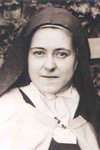 Besides Our Lady, I think St. Therese, whose feast day was today, has had the biggest impact on my spiritual life. Early on in my spiritual journey I was encouraged to read her biography, Story of a Soul, and I fell in love. Never before had the spiritual life been shown, or explained, in such a real way. If you have not read it yet, I HIGHLY recommend it! I have read it twice now, and I’m sure will pick it up again.
Besides Our Lady, I think St. Therese, whose feast day was today, has had the biggest impact on my spiritual life. Early on in my spiritual journey I was encouraged to read her biography, Story of a Soul, and I fell in love. Never before had the spiritual life been shown, or explained, in such a real way. If you have not read it yet, I HIGHLY recommend it! I have read it twice now, and I’m sure will pick it up again.
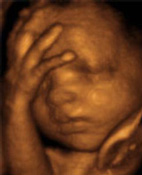 “Human life must be respected and protected absolutely from the moment of conception. From the first mement of his existence, a human being must be recognized as having the rights of a person – among which is the inviolable right of every innocent being to life.” (Catechism of the Catholic Church (CCC), No. 2270)
“Human life must be respected and protected absolutely from the moment of conception. From the first mement of his existence, a human being must be recognized as having the rights of a person – among which is the inviolable right of every innocent being to life.” (Catechism of the Catholic Church (CCC), No. 2270)
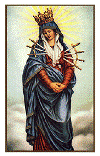 Yes, today is my birthday – number 25. It’s always pretty sobering when I think that when I was conceived, my mother had the legal choice to have me killed before I was born. Thanks, Mom, for choosing life!
Yes, today is my birthday – number 25. It’s always pretty sobering when I think that when I was conceived, my mother had the legal choice to have me killed before I was born. Thanks, Mom, for choosing life! “May I never boast of anything but the cross of our Lord Jesus Christ!” (Galatians 6:14). Today we celebrate the glory and the triumph of the cross of our Savior. In today’s Office, the reading from St. Andrew of Crete says:
“May I never boast of anything but the cross of our Lord Jesus Christ!” (Galatians 6:14). Today we celebrate the glory and the triumph of the cross of our Savior. In today’s Office, the reading from St. Andrew of Crete says: 
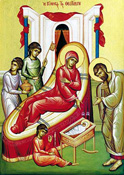 Today is the feast of the Nativity of the Blessed Virgin Mary. As our priest said this morning, today is a feast of hope. It is a reminder of God’s love for us and for what awaits us in heaven. Today we celebrate the birth of the Blessed Virgin, whom God sent to be the Mother of our Lord, who died to offer us eternal life. This is the greatest prayer that I can think of on this blessed day:
Today is the feast of the Nativity of the Blessed Virgin Mary. As our priest said this morning, today is a feast of hope. It is a reminder of God’s love for us and for what awaits us in heaven. Today we celebrate the birth of the Blessed Virgin, whom God sent to be the Mother of our Lord, who died to offer us eternal life. This is the greatest prayer that I can think of on this blessed day: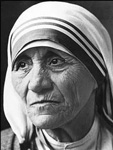 Today was the 10th anniversary of the death of Blessed Teresa of Calcutta. Though we have known of her darkness for some time now, a new book that has come out,
Today was the 10th anniversary of the death of Blessed Teresa of Calcutta. Though we have known of her darkness for some time now, a new book that has come out, 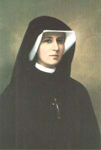 St. Maria Faustina (1905-1938), who I have just begun to read, offers further insight into these trials and God’s relationship with the chosen souls. Though the soul feels abandoned by God, He is still there, perhaps closer than ever, especially in time of temptation:
St. Maria Faustina (1905-1938), who I have just begun to read, offers further insight into these trials and God’s relationship with the chosen souls. Though the soul feels abandoned by God, He is still there, perhaps closer than ever, especially in time of temptation: 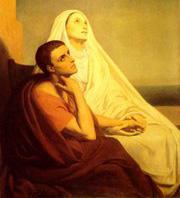 Today we celebrated the feast of the mother of one of the Church’s most celebrated saints. St. Monica, mother of St. Augustine (whose feast day is tomorrow), prayed unceasingly for the conversion of her famous son, and, as we all know, was happily obliged by Our Lord. Not only that, but her husband, Patricius, a pagan with a terrible temper, converted to Christianity and was baptized a year before his death thanks to her prayers as well. She is a wonderful example for married couples and parents who are called to care above all for the spiritual well being of their spouse and children. I believe that it was not only her prayers, but also her example as a pious Christian woman that also won over her husband and son. This passage from 1 Peter makes me think of St. Monica and the example that all married women should give:
Today we celebrated the feast of the mother of one of the Church’s most celebrated saints. St. Monica, mother of St. Augustine (whose feast day is tomorrow), prayed unceasingly for the conversion of her famous son, and, as we all know, was happily obliged by Our Lord. Not only that, but her husband, Patricius, a pagan with a terrible temper, converted to Christianity and was baptized a year before his death thanks to her prayers as well. She is a wonderful example for married couples and parents who are called to care above all for the spiritual well being of their spouse and children. I believe that it was not only her prayers, but also her example as a pious Christian woman that also won over her husband and son. This passage from 1 Peter makes me think of St. Monica and the example that all married women should give: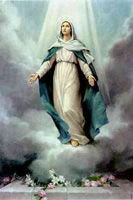 What a wonderful feast day! This is always a very special one for me because it is the day I renew my Total Consecration to Mary. It is a private devotion based on St. Louis DeMontfort’s
What a wonderful feast day! This is always a very special one for me because it is the day I renew my Total Consecration to Mary. It is a private devotion based on St. Louis DeMontfort’s  After expressing my favorable view of the Harry Potter novels recently
After expressing my favorable view of the Harry Potter novels recently  Both of these statements were made in 2003 and, as far as I know no further statements from anywhere in the Vatican have been made and there is no official Catholic position on whether the HP books are good, bad or indifferent. Quite the contrary. There doesn’t even appear to be a general consensus on the matter. With regard to Harry Potter the Catholic world seems pretty split. For example, based on the links offered on
Both of these statements were made in 2003 and, as far as I know no further statements from anywhere in the Vatican have been made and there is no official Catholic position on whether the HP books are good, bad or indifferent. Quite the contrary. There doesn’t even appear to be a general consensus on the matter. With regard to Harry Potter the Catholic world seems pretty split. For example, based on the links offered on  Meanwhile, master Catholic blogger, Mark Shea is a constant
Meanwhile, master Catholic blogger, Mark Shea is a constant  regards to young readers. Both Welborn and Brown suggest explaining to children that Rowling doesn’t believe in magic, dragons and spells herself, but has simply used her imagination to come up with a creative story. Also explain, as I just pointed out, that in the story magic is a natural born talent. One cannot just start casting spells and “become” magical. It is also worth noting that the “spells” in Harry Potter are really just Latin words and many of the “potions” consist of non-existent, mythical ingredients like Acromantula venom, Erumpent parts and unicorn blood. In other words, we’re not talking about real sorcery that would or could be condemned Biblically.
regards to young readers. Both Welborn and Brown suggest explaining to children that Rowling doesn’t believe in magic, dragons and spells herself, but has simply used her imagination to come up with a creative story. Also explain, as I just pointed out, that in the story magic is a natural born talent. One cannot just start casting spells and “become” magical. It is also worth noting that the “spells” in Harry Potter are really just Latin words and many of the “potions” consist of non-existent, mythical ingredients like Acromantula venom, Erumpent parts and unicorn blood. In other words, we’re not talking about real sorcery that would or could be condemned Biblically.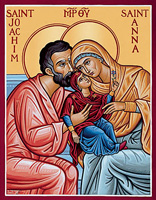 Today is the feast of Sts. Joachim and Anne (my patron saint), believed to be the parents of the Blessed Virgin Mary. The
Today is the feast of Sts. Joachim and Anne (my patron saint), believed to be the parents of the Blessed Virgin Mary. The